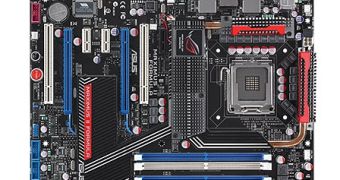ASUS, one of the leading manufacturers of motherboards and the creator of the famous Eee PC, has announced in a recent interview that it has high-hopes regarding the release of the upcoming X58 and x58+NF200-based motherboards. According to the Taiwanese company, it will become the world's first manufacturer to have an X58-based mobo in time for Intel's X58 official announcement.
The guys at bit-tech had the chance to interview ASUS' Senior Director of Motherboard Division Richard Liu, while attending this year's ASUS Advanced Overclocking Championships, which was held earlier this month. The interview took place via email, because of Richard Liu's busy schedule. Even so, the questions from bit-tech were answered, including those on the upcoming Nehalem or Core i7 processors, X58 platforms, overclocking and ExpressGate, ASUS' "instant-on" OS.
Regarding the upcoming Nehalem-supporting motherboards, Richard Liu declared that the Taiwanese manufacturer was doing really well as far as its X58 and X8+NF200 motherboard business was concerned. "Both are going quite well inside ASUS. And we have strong confidence that our X58 motherboard will be the 1st motherboard on time for Intel's launch. Regarding the X58+NF200 board will be a little bit late than X58 board, but we're quite sure ASUS will still be the first in the market," Richard Liu said.
Unfortunately, Liu couldn't let out any details regarding the official release date of Intel's X58 platform, but he did confirm Q4 as a certain period for the availability of the product. Furthermore, it looks like the Nehalem architecture has been easy to work with, Richard Liu even claiming that basically no problems have been encountered in the development and design of the motherboard.
In addition, ASUS plans to make its ExpressGate technology available for the company's high-end and mainstream motherboards. Unfortunately, due to the high licensee fee, ExpressGate for the entry-level segment of motherboards is still far from a general implementation.

 14 DAY TRIAL //
14 DAY TRIAL //